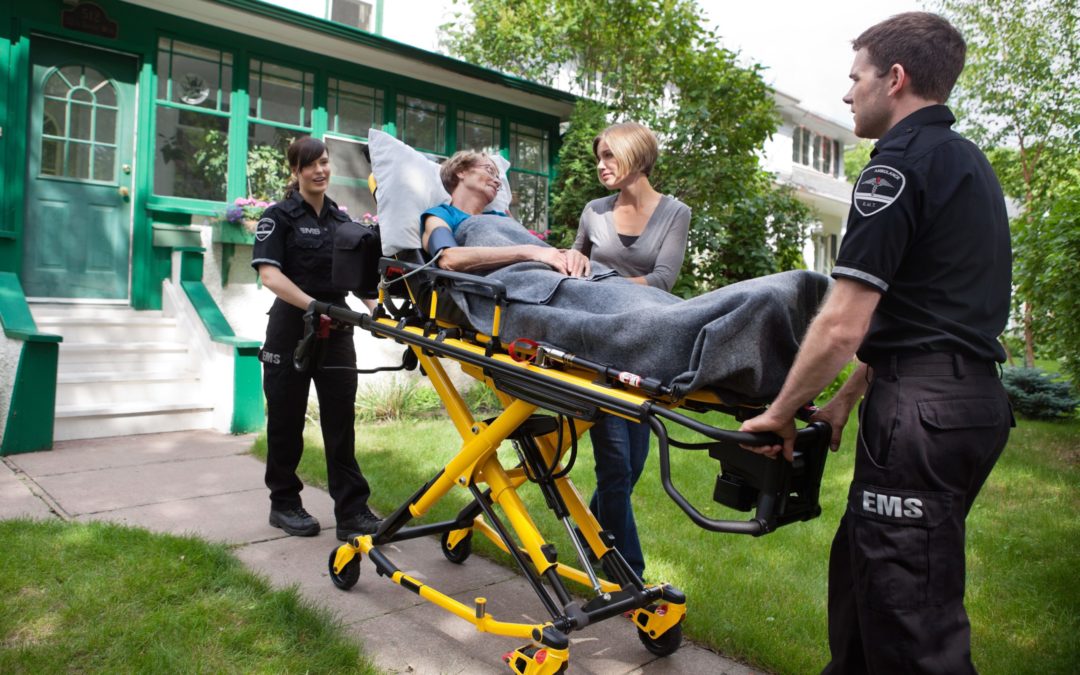Although it’s the nature of the job, what firefighters and paramedics witness while at work is taxing on the mind, jarring on the emotions and can remain forever in their hearts. Post-Traumatic Stress Disorder “PTSD” is the repercussion from life-altering events that happen to fire service professionals. As people outside of the industry, we may not be able to stop the occurrence of PTSD but there are practices we can put into play to help minimize the instances of wildfires. For loved ones of those who work on the front lines, there are also visible signs of the disorder to watch for. It’s fire season, and first responders could use some extra compassion in and how to detect PTSD.
The Adrenaline Rush that Never Goes Away
During any number of calls answered by a team of emergency-response professionals, the body and the brain work together instantaneously from the moment the buzzer goes off in the squad room. Every firefighter experiences the onset of the human fight-or-flight response. It’s the natural, built-in mechanism to handle stress. With it, a surge of adrenaline is released providing us heightened abilities in mental acuity and physical strength allowing us to better handle traumatic circumstances.
Over time and with multiple traumatic events, the normal course of a firefighter or EMS worker, it takes a toll on mental and emotional wellbeing. Without ongoing therapy or other means of healthy communication after these traumas take place, first responders are often left to dwell in their own thoughts that never leave. With no healthy outlet, the internal stress escalates. In addition to the development of PTSD other conditions may arise as a result. Oftentimes, victims of PTSD will defer to substance abuse to help drown the emotional pain. Other anxiety or depressive disorders can also be present with PTSD. Unfortunately, PTSD exists in firefighters long before the signs are evident to the rest of us.
The Heroic Burden of First Responders:
- Unwavering Dedication: First responders, including paramedics, firefighters, police officers, and emergency medical technicians (EMTs), put their lives on the line daily to safeguard their communities.
- High-Stress Environment: The nature of their work exposes them to trauma, violence, accidents, and other distressing incidents.
Understanding PTSD:
- The Impact of Trauma: PTSD is a psychological disorder that can develop after experiencing or witnessing traumatic events.
- Triggers and Symptoms: PTSD can cause intrusive memories, nightmares, flashbacks, emotional numbness, and heightened arousal.
Prevalence Among First Responders:
- Alarming Statistics: Studies show that first responders have a higher risk of developing PTSD compared to the general population.
- Underreported Cases: Stigma and reluctance to seek help often lead to underreporting of PTSD cases in first responders.
Signs of PTSD in First Responders:
- Re-Experiencing Trauma: Flashbacks, nightmares, and intrusive thoughts about traumatic events.
Avoidance Behavior: Avoiding situations, places, or people that remind them of the traumatic event. - Negative Mood and Cognition: Feeling detached, negative emotions, distorted thoughts, and loss of interest in activities.
- Hyperarousal: Being easily startled, difficulty concentrating, irritability, and sleep disturbances.
Factors Influencing PTSD Risk:
- Nature of Trauma: Exposure to severe trauma, like losing a colleague or witnessing gruesome accidents, increases the risk.
- Frequency of Exposure: Frequent exposure to traumatic events intensifies the risk of developing PTSD.
- Coping Mechanisms: Coping through substance abuse, avoidance, or isolation can worsen PTSD symptoms.
The Silent Struggle:
- Stigma and Denial: Fear of appearing weak or being stigmatized can prevent first responders from seeking help.
- Masking Symptoms: First responders often mask their distress to continue performing their duties, delaying intervention.
Navigating Treatment and Support:
- Importance of Early Intervention: Timely diagnosis and treatment can prevent long-term psychological damage.
- Seeking Professional Help: Psychotherapy, such as cognitive-behavioral therapy (CBT) and eye movement desensitization and reprocessing (EMDR), are effective in treating PTSD.
- Peer Support: Encouraging an environment where first responders can talk openly about their experiences without judgment.
- Comprehensive Care: Holistic approaches, including mindfulness, exercise, and nutrition, can aid in recovery.
- Family Involvement: Involving families in therapy can provide understanding and support.
Creating a Supportive Environment:
- Mental Health Training: Providing mandatory mental health training to recognize signs of distress among peers.
- Confidential Resources: Establishing confidential helplines or counseling services for first responders.
- Reduced Stigma: Fostering a culture that emphasizes seeking help as a sign of strength rather than weakness.
Taking the First Step:
- Self-Awareness: Encouraging first responders to reflect on their emotions and reactions to traumatic events.
- Identifying Triggers: Recognizing triggers that intensify stress and seeking healthy coping strategies.
Long-Term Resilience:
- Resilience Building: Teaching stress management techniques and resilience skills to cope with ongoing challenges.
- Continued Support: Offering ongoing therapy and support to prevent relapse and manage triggers.
Intervention, comprehensive treatment, and creating a supportive environment:
The unwavering dedication of first responders deserves recognition and support, especially when they face the invisible wounds of PTSD. As a leading rehab, recovery, and detox center, we emphasize the critical role of early intervention, comprehensive treatment, and creating a supportive environment. By raising awareness about PTSD among first responders, we hope to break down barriers, reduce stigma, and pave the way for a healthier future for those who dedicate their lives to our safety. Let us stand united in providing the help and support that our heroes need to heal and thrive.

